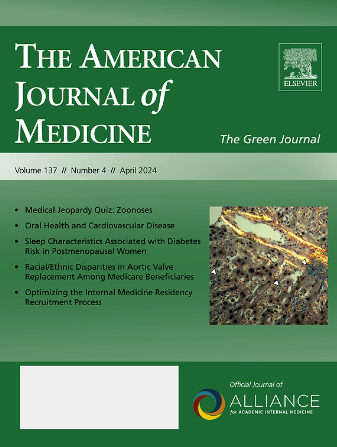戒烟与工作年龄男性患高血压的几率;体重变化的影响。
IF 2.5
3区 医学
Q1 MEDICINE, GENERAL & INTERNAL
引用次数: 0
摘要
背景:吸烟会升高血压(BP),而戒烟会增加体重(BW),这使新戒烟者易患高血压。本研究旨在调查戒烟及随后体重变化对高血压发病几率的影响:方法:共对 10354 名无高血压的日本男性工人进行了为期三年的跟踪调查,以检测高血压的发展情况。根据吸烟状况(非吸烟者、新戒烟者或持续吸烟者)和体重变化(≥3 kg 或 结果)将他们分为六组:在随访期间,有 1,032 名参与者(平均年龄为 38.4 ± 8.8 岁)患上了高血压。在对多种潜在混杂因素进行调整后,与体重增加的非吸烟者相比,体重增加≥3 千克的新戒烟者患高血压的几率明显更高(OR,2.95,95% 置信区间[CI],1.37-6.35):只有在戒烟后体重增加未得到控制的情况下,新戒烟者患高血压的几率才会增加。本文章由计算机程序翻译,如有差异,请以英文原文为准。
Smoking Cessation and the Odds of Developing Hypertension in a Working-Age Male Population: The Impact of Body Weight Changes
Background
Smoking elevates blood pressure (BP) whereas smoking cessation increases body weight (BW), which predisposes new quitters to the development of hypertension. This study aimed to investigate the effect of smoking cessation and subsequent BW change on the odds of developing hypertension.
Methods
A total of 10,354 Japanese male workers (mean age, 38.4 ± 8.8 years) without hypertension who underwent a baseline annual medical checkup were followed up for three years to detect the development of hypertension. They were divided into six groups according to their smoking status (nonsmokers, new quitters, or continuous smokers) and BW change (≥3 kg or <3 kg) during the follow-up period. Logistic regression analysis was used to calculate odds ratio (OR) for developing hypertension.
Results
During the follow-up period, 1,032 participants developed hypertension. After adjusting for multiple potential confounders, the odds of developing hypertension were significantly higher in new quitters with BW gains ≥ 3 kg (OR, 2.95, 95% confidence interval [CI], 1.37-6.35) compared to nonsmokers with BW gains < 3 kg. However, increased odds of developing hypertension were not observed in those with BW gains < 3 kg (OR, 0.90, 95% CI, 0.52-1.58). Continuous smokers were at increased odds of developing hypertension regardless of their BW changes (BW gain < 3 kg, OR, 1.35, 95% CI, 1.13-1.61 vs. BW gain ≥ 3 kg, OR, 1.90, 95% CI, 1.43-2.52).
Conclusions
The odds of developing hypertension were increased in new quitters only when their BW gain was not controlled after smoking cessation.
求助全文
通过发布文献求助,成功后即可免费获取论文全文。
去求助
来源期刊

American Journal of Medicine
医学-医学:内科
CiteScore
6.30
自引率
3.40%
发文量
449
审稿时长
9 days
期刊介绍:
The American Journal of Medicine - "The Green Journal" - publishes original clinical research of interest to physicians in internal medicine, both in academia and community-based practice. AJM is the official journal of the Alliance for Academic Internal Medicine, a prestigious group comprising internal medicine department chairs at more than 125 medical schools across the U.S. Each issue carries useful reviews as well as seminal articles of immediate interest to the practicing physician, including peer-reviewed, original scientific studies that have direct clinical significance and position papers on health care issues, medical education, and public policy.
 求助内容:
求助内容: 应助结果提醒方式:
应助结果提醒方式:


